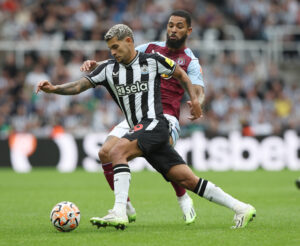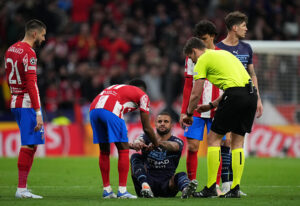With the Big Six’s involvement with the proposed European Super League (ESL) recently, there have been potential implications regarding the finances of the Premier League and the English football pyramid.
Although the six clubs, Manchester City, Manchester United, Arsenal, Chelsea, Liverpool and Tottenham Hotspur, have all withdrawn from the ESL, questions over their worth to the Premier League, both on and off the pitch, have been asked.
Unsurprisingly, these high-profile clubs bring many fans, revenue and lucrative sponsorship deals to the Premier League. All the income generated has a wider impact on English football. But there would also be an impact on results and league standings in purely footballing terms.
What Impact Would the Big Six Leaving the Premier League Have?
Match Results
If the Big Six left the Premier League, results on the pitch would change drastically. Teams like West Ham United and Leicester City have gone toe-to-toe with the Big Six in the 2020/21 season. Brendan Rodgers’ side, in particular, have fared well against Liverpool, Manchester City, Tottenham and Chelsea in the top flight this season.
West Ham have also taken points off Arsenal, Tottenham and Manchester City, while Leeds United have beaten or drawn with City, Liverpool and Manchester United in the past two weeks.
Leicester, West Ham and Leeds would certainly benefit from the Big Six leaving the Premier League in the 2020/21 season. But these overperforming clubs have also beaten a lot of similar teams. The Hammers have taken the largest number of points (49 from a possible 66) against the 14 teams outside the top six, while Leicester have 40 points from the ‘other 14’.
However, West Ham’s dominance over the ‘other 14’ clubs is an anomaly this season. In previous seasons, other teams have secured good results against teams outside the top six. For example, Wolverhampton Wanderers were the standout performers in the 2018/19 and 2019/20 seasons, finishing seventh in the Premier League for consecutive years.
In 2017/18, Burnley finished in seventh after winning just one match all season against the clubs from the Big Six. Going further back to 2015/16, when Leicester famously won the Premier League, all three of their league losses came against Big Six opposition. If the top six sides weren’t involved in the title chase, Leicester would have had an unbeaten season and walked the Premier League.
Without the Big Six, mid-table teams, or even newly-promoted clubs, have a greater chance to be competitive and pick up results from one another in the Premier League.
Premier League Viewership
In 2020, an estimated three billion people from 188 countries watched the Premier League, but not all teams were viewed equally.
Two of the Big Six clubs, Liverpool and Manchester United, attract some of the largest worldwide audiences from broadcasted matches in the Premier League. Historically, the clubs have enticed fans worldwide, following their spells of top-flight dominance between the 1980s and 2000s.
This trend continued with the rise of the Premier League from 1992. Deals with Sky Sports, then BT and Amazon, increased interest in the top-performing teams in the Premier League
The competition has risen in popularity over the past three decades. As a result, the amount of money from broadcasting has also increased. Liverpool, who won the league title in the 2019/20 season, earned over £71 million from TV income. Runners up Manchester City received £69 million and third-placed Manchester United got £68 million.
Without viewer interest in these teams, the amount of TV revenue would decrease substantially. By comparison, the bottom side in the 2019/20 season, Norwich City, received around £44 million in TV revenue.
The figures for viewership are driven and dominated by global interest in the top-performing clubs. Consequently, the more TV revenue generated, the higher share each club receives.
Lower Sponsorship Deals
In the current Premier League season, the Big Six have shirt sponsorship deals that well surpass those of their 14 other competitors.
Manchester United’s deal with Chevrolet is the most lucrative in the league at £64 million. Manchester City’s agreement with Etihad is worth £45 million, while Chelsea, Arsenal and Liverpool’s sponsorship deals are worth £40 million. Spurs received £36 million with AIG.
There is then a massive disparity between the remaining 14 teams. The most lucrative sponsorship outside of the top six is West Ham’s £10 million deal with Betway – more than a third less compared with Spurs’ income and six times lower than United’s revenue from Chevrolet.
Looking further outside of the Big Six, Brighton & Hove Albion have the lowest sponsorship deal with American Express. The South Coast club took just £1.5 million from their sponsorship with AMEX.
All of the income generated from the top clubs has a massive impact on the Premier League, the English Football League and non-league football in England. If the Big Six clubs withdrew from the Premier League, there would be less global audience interest in the English game, which would leave clubs with less income at every level. While revenue from broadcasting and sponsorship is unequal, the money taken by the top clubs does, in some way, filter to the remaining 14 clubs in the top league and beyond.
Main Photo






